Yuu Miyake and Yoshihito Yano Interview: MAGFest 13
Yuu Miyake is a game music pioneer best known for being the sound director and lead composer for the Katamari Damacy series. In 2011, he left Bandai Namco Studios to embark on a career as a freelance composer. Since doing so, he has embarked on a range of new projects and collaborations, between continuing to work on the Katamari and Ridge Racer franchises.
Yoshihito Yano is the Lead Sound Designer at Bandai Namco Studios, working on the music and sound design of a vast number of series including Soulcalibur, Katamari Damacy and Tekken, and acting as sound director for Tekken 6 and Soulcalibur Legends.
In this interview conducted during MAGFest 13 in National Harbor, Maryland, Miyake and Yano discuss their work on the music of Katamari Damacy while also explaining how they got their start in the videogame industry.
Interview Credits
Interview Subjects: Yuu Miyake, Yoshihito Yano
Interviewer: Patrick Kulikowski
Translator: Maho Azuma
Editors: Patrick Kulikowski, Chris Greening
Video: Damian Kulikowski
Coordination: Patrick Kulikowski, Nick Marinelli, Maho Azuma
Interview Video
Interview Content
Patrick: Yuu Miyake and Yoshihito Yano, thank you so much for taking the time. Maho, thank you for providing translation for us today. I wanted to start out with how you are enjoying MAGFest, both of you?
Yoshihito Yano: The energy from the fans is just so overwhelming, and everyone is just so hot and crazy. I’m getting a lot of energy.
Yuu Miyake: I came here expecting a music event, but when we came here there are so many arcade games! I’m a huge fan of arcade games, so for me it’s like, “yes!”
Patrick: Yeah, a lot of Namco games.
Yuu Miyake: Atari…Namco.
Patrick: Any specific favorite arcade game that’s here?
Yuu Miyake: It’s a Taito shooting game…Darius II.
Patrick: How did the both of you get started with music? Was it young age? What instruments did you learn growing up?
Yoshihito Yano: It was in elementary school when I first picked up the keyboard. I discovered that maybe I wasn’t that great at composing, however I would listen to songs from TV, songs from videogames and just using my ears to play along to it.
Yuu Miyake: I started on keyboard also, only for three months because it was really, really bad. The pieces they required me to play were these children’s [songs], like “we’re getting piano!” I hated doing that so much so I just started listening to music as opposed to playing music, until my second year of middle school is when I got a PC and that’s when I started really getting into sound.
Patrick: How did you get into the videogame industry? What brought you to Namco?
Yoshihito Yano: Since a young age I really liked many Namco pieces and I also played them by ear. When I first went into Namco, they were doing Ridge Racer; it was a big game. And I thought “this is great, I want to do it.” It was my entrance into it.
Patrick: You just applied, and that was it?
Yoshihito Yano: I submitted a demo tape, and they liked it.
Patrick: Was that demo tape used in a game?
Yoshihito Yano: No, it wasn’t used in a game.
Yuu Miyake: There is a techno group in Japan that was really popular when I was in the sixth grade, Yellow Magic Orchestra. I really liked them a lot. They produced a CD with Namco. I was listening to it, and one of the people who produced the CD was actually one of the members of that group. It was the first time I really enjoyed listening to game music. When most people around that time were listening to J-pop, I was listening to videogame soundtrack music. I just applied to the position, in order to “make memories.” That was my [main goal].
Patrick: That’s very sweet.
Yuu Miyake: And then [Namco] was like “OK!” [laughter]
Patrick: Very easy to get into Namco back then, I guess! Obviously one of the biggest soundtracks, or most popular soundtracks you worked on was the Katamari Damacy series. With the original Katamari, I read that the lyrics were made first before the music was made. So I was wondering how difficult it was to frame music around those lyrics, and whether you wrote the lyrics initially, or were they written by someone else?
Yuu Miyake: Actually, it depends on the composer, since there was a bunch of composers who worked on this. It wasn’t necessarily that the lyrics came first, in some circumstances they didn’t, so for me in particular the lyrics actually came after. But, it depends on the composer. But the composers, each one of them wrote the lyrics to their songs. As a whole, it was difficult, but a very great experience for everyone to do it, because the composers are the ones who can create the best sound that they’re looking for and it helped to shape the world of Katamari.
Patrick: Going into one of those songs…a very simplistic song, but “WANDA WANDA.” Those are the only lyrics in the song and I was curious about how you created that and why the word “WANDA?”
Yuu Miyake: This is a funny story. There is this TV show, a superhero in Japan, I don’t know what it is in English, but it’s “Ultra Seven.” When they go off to fight the enemy, that moment, they’re on this airplane. *makes the WANDA WANDA sound*
Patrick: That’s the sound they make when they’re going?
Yuu Miyake: Yeah, but they “scat” it. I just kind of changed it a little bit, and made it into “WANDA WANDA.” When I was little, I thought it was really weird. I thought “why ‘wandawandabuwandawanda?”” But it does stick in your ear, so I wanted to use it. It was like “this would be great to be catchy for other people too!”
Patrick: It’s very, very catchy. It’s in the beginning, so you’re learning the Katamari controls and everything, and that’s the first song I really memorized.
The Katamari soundtracks have a lot of old school ENKA and pop singers on the project. I was wondering how did you get all of these people to collaborate on this project? Was it easy? For a lot of them, people were wondering whatever happened to them at that point. They didn’t release anything recently back then. So I was wondering how you were able to find all of these people to work on the project?
Yuu Miyake: It was a very difficult process, especially when we were trying to get one of the singers to come by, but if their schedule doesn’t match, then production time is lengthened. There was one guy in particular we tried to get, and when we did — I’m really wondering if we should really say this or not – gang-like members came out to stop them. A lot of issues came up. Our target audience was very difficult for us to establish when we were making the game. Because we didn’t know who exactly wanted to play the game, we wanted to reach as many people as possible. So we incorporated as many genres, that’s why it’s all ENKA and the like, so it could be played by as many people as possible.
Patrick: For example, I know in “Cherry Blossom Color Season,” there’s a children’s chorus, so there are some things that are geared towards children. I was curious about some of the hip-hop that was in it, like “The Moon and the Prince.” That was Kenji Ninuma, rapping. So I was wondering how you were able to get him to do a rap like that.
Yuu Miyake: Originally, I wanted everyone from a child to a grandfather to enjoy the soundtrack. When you ask them to do ENKA, they just sing ENKA, it just becomes ENKA. And then the younger generation kind of has this, I don’t want to say negative, but a different image of ENKA, traditional music. So I thought “oh, why don’t we just make it into a rap, a little bit? A festival?” So slowly, I would ask [Ninuma] to make just one sound, “HA! YO!” and tell him it’s a festival. Slowly, he warmed up to the idea.
Patrick: I also read for the sequel, We Love Katamari, you originally wanted to see if you could get American singers on the project, but you weren’t able to. So I was curious to know who were you interested in having on that project if it was possible?
Yuu Miyake: I just wanted [people] from different regions from America. *imitates James Brown singing* “Na-NAAAAAA!!!” I just wanted to loop that. Then the Katamari director interrupted me and said “you can’t do that.” [laughter]
Patrick: This is more directed towards Yano-san. How did you find out about the band LONELYROLLINGSTARS that’s playing at MAGFest today?
Yoshihito Yano: So a year ago, basically on Twitter, Chuck [Simpson] from LONELYROLLINGSTARS actually sent me a video of their cover of “Lonely Rolling Star” and said “hey, check this out!” I saw the video and I was so impressed by their cover, I retweeted it. That’s how we got to know each other.
Patrick: Are you going to be performing today with LONELYROLLINGSTARS on piano?
Yoshihito Yano: I don’t know if I’m going to perform but I know I’ll be on stage with them. They will call me on stage but I don’t know exactly how it’s going to go.
Patrick: I did see a video last night. Yano-san was in the hotel room of the LONELYROLLINGSTARS, and during the chorus, was rolling a katamari around.
Yoshihito Yano: …That’s so fast! [laughter]
Patrick: The internet goes very fast. For “Lonely Rolling Star,” that had a pretty popular J-pop singer on there. I was wondering: were you directing her in terms of the singing, how she should sing the song, in addition to the composing?
Yoshihito Yano: That was quite a long time ago, but basically I would direct her in terms of the length of each syllable, how long or how short, how her tone should change when she said certain lyrics.
Patrick: Miyake-san, you no longer work with Bandai Namco, you freelance and DJ. So, I was curious to know why you broke away from Namco. I’ve noticed this trend with a lot of game composers to break away from their companies, their publishers, to work on their own. Do you find that very liberating? Do you think more composers should attempt that?
Yuu Miyake: The reason I stopped was because I felt I couldn’t grow anymore as an artist in my field. I personally don’t know about everyone else, but that’s why I stopped. When you’re freelancing, you have to grow. That’s the only way you can. Because of that, I discovered that I’ve been able to grow a lot more when I started freelancing.
Patrick: What can we expect from the future from both Yano-san and Miyake-san?
Yuu Miyake: On the plane ride over, we actually spoke a lot about our dreams for the future. If we were to make a group, like a band, we’d want to have one where we could hit the drum set and it would produce electricity. Of course, I will continue to do things that clients would come to him, I would love to work on pieces. But also I want to do things I can only do now as a freelancer, more of my own personal works as opposed to things attached to other things.
Yoshihito Yano: I am still in Bandai Namco Productions. Within the company, I would like to find a way to continue being better at sound production and finding my own personal voice but growing along with the company.
Patrick: Making that katamari bigger. Finally, do you have a message to videogame music fans across the world?
Yuu Miyake: This is really hard for Japanese people. It’s hard because I’m also a videogame music fan. I would like to follow traditions, and break all the traditions at the same time.
Yoshihito Yano: Just like the Katamari ball that keeps growing and evolving, I would like to continue giving people inspiration and excitement through the games we keep making.
Patrick: Thank you very much Yano-san and Miyake-san. And Maho, for translating. I really appreciate that.
Yuu Miyake: One last thing. Normally in videogames, you’re actually not allowed to have in-game lyrics going on, because it distracts from the visuals. However, with Katamari we “okayed” it.
Patrick: That’s right. It’s usually reserved for cutscenes. Vocals, things like that. It’s very, very rare when there are lyrics during gameplay.
I guess, if you don’t mind a little “aside” question: the record-scratching. When the King of All Cosmos is talking, it’s a record-scratch *imitates record scratch*. Was that your idea? How did that come about?
Yuu Miyake: Yes, that was my idea. I knew that the King shouldn’t speak a normal language, like English. I couldn’t hire a voice actor to do it. At the same time, I didn’t want bloops and bleeps that are prevalent in Dragon Quest. I wanted to make it fun, however not use actual words. The only thing I could think of was the sound of the scratching record. I thought, “This is perfect!”
Patrick: Thank you very much.
Yuu Miyake’s Live DJ Set at MAGFest 13
LONELYROLLINGSTARS and Yoshihito Yano at MAGFest 13
Posted on February 24, 2015 by Patrick Kulikowski. Last modified on February 27, 2015.

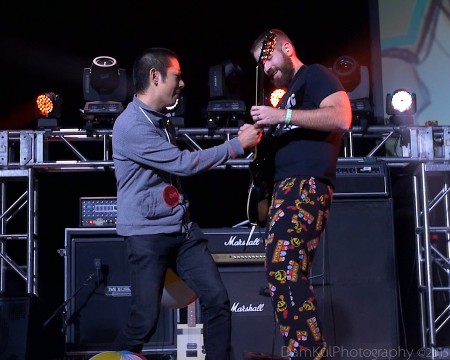
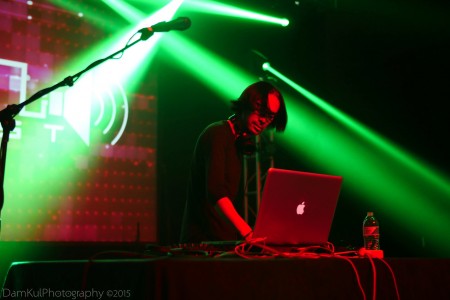
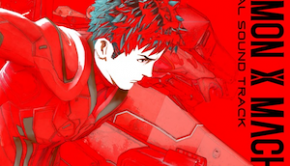
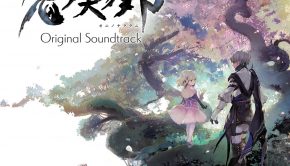
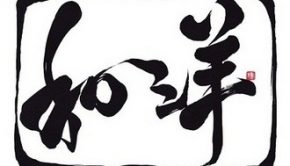
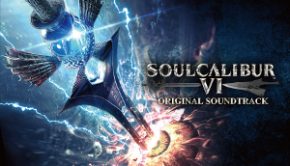










Fantastic interview. You did a great job with all of it!
I’ve loved the Katamari soundtracks for a while but never looked further into the composers until recently. This had a lot of insight and great little trivia tidbits, so thanks for this! I can only imagine what Katamari would have been like with American singers…